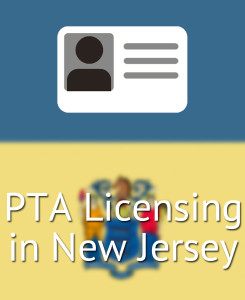
✔️ Page updated: August 19th, 2023
This page has all of the information laid out in steps, including application forms, and fees to become a physical therapist assistant in New Jersey and get licensed.
New Jersey Physical Therapy Assistant licensing is regulated by the New Jersey State Board of Physical Therapy Examiners. Like other states, you must first complete an accredited PTA program before applying for your PTA license in New Jersey.
Steps to Become a PTA in New Jersey
Here is a checklist offered by the New Jersey State Board of Physical Therapy Examiners to ensure you meet all the requirements to become a licensed PTA in New Jersey. Below are the steps outlined in the checklist.
- Contact your PTA Program’s registrar and have an official sealed transcript sent to:
State Board of Physical Therapy Examiners
P.O. Box 45014
Newark, N.J. 07101
- Complete your application and send it along with a nonrefundable check or money order in the amount of $125.00 to the “State Board of Physical Therapy Examiners” at the same address above
- Include a Passport style photo with your application
- Complete and return the Jurisprudence and Law Examination included with your application packet
- Complete the National Physical Therapy Assistant Exam (NPTAE)
New Jersey PTA License Application
For detailed information and instructions to become a PTA in New Jersey, see the board’s Application form. To download the form, right click the icon to the right and then click on “Save As” to save the PDF file.
More PTA Info for New Jersey:
Learn how to become a physical therapist assistant in 7 steps completing all education and licensing requirements.
Step 1. Complete a Physical Therapist Assistant (PTA) Associate’s Degree Program
To become a licensed Physical Therapist Assistant (PTA) in New Jersey, the first step is to complete an Associate’s Degree Program in Physical Therapist Assisting. These programs are available at various colleges and universities in the state. You can enter your zip code below to see programs near you.
You can also use these resources to research CAPTE Accredited PTA Programs:
It is important to choose a program that is accredited by the Commission on Accreditation in Physical Therapy Education (CAPTE) and approved by the New Jersey Board of Physical Therapy Examiners. This ensures that the program meets the necessary standards and provides quality education.
The duration of a PTA Associate’s Degree Program is typically two years, although some programs may offer an accelerated option. During this time, students will receive both classroom instruction and hands-on clinical training to develop the necessary skills for the profession.
In addition to meeting the educational requirements, admission into a PTA program may also require volunteer or work experience in the field of physical therapy. This allows students to gain exposure to the profession and demonstrate their dedication and commitment to pursuing a career as a PTA.
Overall, completing a CAPTE-accredited PTA Associate’s Degree Program is an essential step in obtaining a PTA license in New Jersey. It provides the necessary education and training to prepare individuals for a rewarding career in physical therapy assisting.
Step 2. Pass the New Jersey Jurisprudence Assessment Module (NJ JAM) and Submit an Application for Licensure by Examination
After completing the Physical Therapist Assistant (PTA) program, the next step towards obtaining a PTA license in New Jersey is to pass the New Jersey Jurisprudence Assessment Module (NJ JAM) and submit an application for licensure by examination.
The NJ JAM is an online assessment module that covers the laws, rules, and regulations governing the practice of physical therapy in New Jersey. It evaluates a candidate’s knowledge and understanding of the state-specific regulations and professional ethics.
To pass the NJ JAM, a minimum score of 75% is required. The exam fee is $30, which can be paid online when registering for the assessment module.
Once the NJ JAM is successfully passed, an application for licensure by examination must be submitted to the New Jersey Board of Physical Therapy Examiners. The application fee is $150, payable by check or money order.
Along with the completed application form, the applicant must also provide supporting documents such as official transcripts, a passport-sized photograph, and a detailed score report from the NJ JAM. The application and documents should be mailed to the following address:
New Jersey Board of Physical Therapy Examiners
P.O. Box 45014
Newark, NJ 07101
It is important to ensure that all requirements are met and all documents are included in the application to avoid any delays in the licensure process. Once the application is received and reviewed, the board will determine the eligibility for licensure as a PTA in New Jersey.
Step 3. Pass the National Physical Therapy Examination (NPTE) for PTAs
Passing the NPTE-PTA exam is a crucial step in obtaining a PTA license in New Jersey. The exam assesses the candidate’s knowledge and understanding of various topics related to physical therapy. To start the process, candidates must reserve a testing site through Prometric, the testing agency for the NPTE.
Before taking the exam, it is important to thoroughly study the FSBPT candidate handbook, which provides detailed information about the exam format, content, and scoring. Additionally, candidates are encouraged to take the online practice exam, which helps familiarize them with the exam structure and type of questions.
The NPTE-PTA exam covers a wide range of topics, including physical therapy data collection, interventions, therapeutics, and therapeutic modalities. It is essential to have a comprehensive understanding of these subject areas to perform well on the exam.
To pass the NPTE-PTA exam, candidates must achieve a minimum score of 600. It is recommended to dedicate ample time to studying and preparing for the exam to increase the chances of success.
By passing the NPTE-PTA exam, candidates demonstrate their competency in the field of physical therapy and meet the education requirements necessary for obtaining a PTA license in New Jersey.
Step 4. Establish your Career as a Physical Therapist Assistant in New Jersey
Once you have obtained your PTA license in New Jersey, you will have an array of career options to choose from. PTAs can work in a variety of settings, including outpatient clinics, nursing homes, hospitals, and even in independent practice under the supervision of a licensed physical therapist.
Outpatient clinics are common places where PTAs provide treatment to patients with a wide range of musculoskeletal conditions. These clinics often specialize in physical therapy services and offer a comfortable environment for patients to receive therapy.
Nursing homes also employ PTAs to provide rehabilitative care to their residents. PTAs assist in helping residents regain mobility, improve strength, and manage pain.
Hospitals are another common setting where PTAs work. They assist physical therapists in providing care to patients recovering from surgeries, injuries, or those with chronic conditions. Hospitals often have a diverse patient population, providing PTAs with a variety of experiences.
Lastly, some PTAs may choose to work independently under the supervision of a licensed physical therapist. In these cases, they may have their own clinic or provide home-based therapy services to clients.
As the field of physical therapy continues to grow, more opportunities for PTAs are becoming available. It is important to stay informed and explore different career options to find the right fit for you.
Step 5. Renew your Physical Therapist Assistant License Every Two Years
To renew your Physical Therapist Assistant (PTA) license in New Jersey every two years, you must follow a specific process and meet certain requirements.
The New Jersey Board of Physical Therapy Examiners will send you a renewal notice approximately 90 days before your license expiration date. You have the option to renew online or by mail. The renewal fee is $80, and there is an additional late fee of $30 if you fail to renew by the expiration date.
Continuing education is a requirement for license renewal. You must complete 30 continuing education contact hours during the two-year renewal period. These hours should be in courses related to your professional practice and align with the Board’s requirements. Approved courses can be found on the Board’s website.
You will need to document and maintain evidence of completion of the continuing education courses you have taken. However, you are not required to submit documentation unless you are selected for a random education audit. If selected, you must submit your education records.
The processing time for license renewal can take up to two weeks. It is important to submit your renewal application and fee well in advance to avoid any delays in the renewal process.
Renewing your PTA license every two years ensures that you remain in good standing and compliant with the New Jersey Board of Physical Therapy Examiners. Don’t forget to keep track of your continuing education hours to meet the renewal requirements.
Why Be a PTA in New Jersey?
- PTA Salaries in New Jersey are amongst some of the highest PTA salaries in the U.S.
- There are a lot of great accredited PTA programs in New Jersey
More PTA Info for New Jersey:

